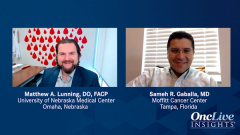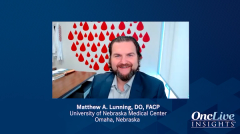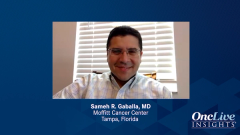
Recent Treatment Guideline Updates in Follicular Lymphoma
Experts Sameh Gaballa, MD, and Matthew Lunning, DO, FACP, reflect on recent updates to the treatment guidelines for patients with follicular lymphoma.
Episodes in this series

Transcript:
Sameh R. Gaballa, MD: Hello and welcome to this OncLive® My Treatment Approach program titled, “My Treatment Approach: Expanding Treatment Options for Relapsed/Refractory Follicular Lymphoma.” I’m Sameh Gaballa. I’m an associate member at Moffitt Cancer Center, in the lymphoma section within the department of hematological malignancies. I’m joined today by my colleague, Dr Matthew Lunning. I would like to welcome him to introduce himself.
Matthew A. Lunning, DO, FACP: Thanks. Matt Lunning, from the University of Nebraska Medical Center. I’m an associate professor here in the division of hematology oncology.
Sameh R. Gaballa, MD: Welcome and thank you for joining me. Today, we’re going to discuss approaches to treating patients with follicular lymphoma. We will present 2 hypothetical clinical scenarios and discuss our treatment plan to illustrate how we incorporate some of the recent data into our practices. Let’s get started.
Matthew A. Lunning, DO, FACP: Dr Gaballa, we know that follicular lymphoma is our most common indolent lymphoma. Many times this disease lives on a spectrum, from being incidentally diagnosed based upon a CT scan done for some other reason, or patients come in with symptomatic bulky disease, and on a biopsy it’s follicular lymphoma. We’ve seen a lot of movement in the NCCN [National Comprehensive Cancer Network] guidelines around follicular lymphoma. Has your testing for newly diagnosed follicular lymphoma changed at all with the recent NCCN guidelines?
Sameh R. Gaballa, MD: Thank you, Matt. In terms of newly diagnosed patients, we have not been testing for EZH2 mutations. Even for the relapsed/refractory setting, the recent NCCN guideline updates back in March, they don’t require it at this time. That makes a lot of sense because if you think about it, the situations in which you’re going to need to know what the EZH2 status is are very limited. For example, if you have someone coming in who’s older, in the second or third line, and they’re not going to go for bispecific [antibodies] or CAR [chimeric antigen receptor] T-[cell therapy], they’re looking, for example, for an oral therapy. This is a patient situation where you’re going to be recommending something like tazemetostat regardless of the EZH2 mutation. That’s one scenario.
The other scenario is in the third line and beyond, the NCCN now also is not mandating the EZH2 testing. It comes down to the same situation. In most of the patient clinical scenarios, you’re not going to need to know the EZH2 mutational status. We know that, for example, tazemetostat will have activity in both wild type and EZH2 mutated status. You’ll have to think about the patient scenario, is this a patient who will need more intense therapies, like bispecific antibodies or CAR T-cell therapy, or are you looking for some less aggressive therapy? In this situation, you really don’t need to know the EZH2 mutational status. That’s also important because a lot of the PI3 kinase inhibitors that were previously indicated for follicular lymphoma, are now not available for follicular lymphoma. That doesn’t leave a lot of oral options available for these patients anyway.
Matthew A. Lunning, DO, FACP: I agree with you. There have been some seismic shifts recently in relapsed/refractory follicular lymphoma, not only with the introduction of mosunetuzumab in the relapsed/refractory space, but also having tisa-cel [tisagenlecleucel] and axi-cel [axicabtagene ciloleucel] from a CAR T-cell standpoint. But if I’ve etched those out of the equation for the management, based upon likely patient characteristics more so, and I’m looking for an oral therapy for a patient who’s either frail, advanced age, or has other comorbidities that preclude them from CAR T-cell bispecifics, I had been doing EZH2 mutational status just to have the discussion about whether they were in that 20% who had mutated EZH2 over wild type. Perhaps they would have better odds of response. But if you look at the data, the duration of response was fairly similar regardless of mutated status or wild type. The only thing that seemed to drive it, at least in the clinical trials, was maybe a slightly higher overall response rate. But I think that’s being further called into question. I know in the matched analysis set in this patient population, maybe that wasn’t the case. I think that may have been driving a bit more the relevance of checking EZH2 status.
I still have the conversation. It’s become easier over time to get the test. It was an uphill battle to get the test results. Now as data emerge, your practice evolves. If our practice isn’t evolving, then we’re not using the data to help inform us, and therefore inform our patients.
Transcript edited for clarity.







































